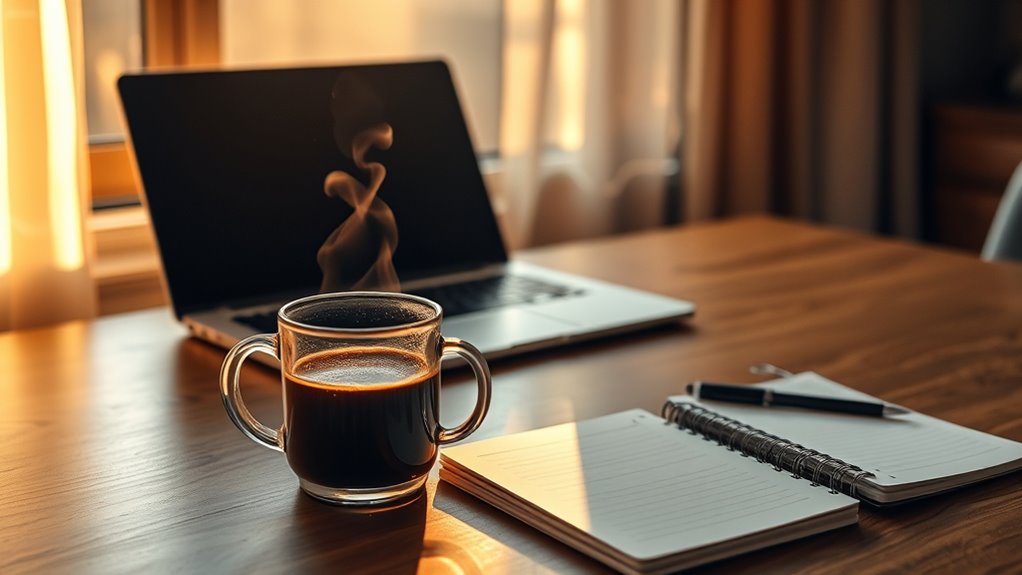To boost your productivity, time your coffee intake when your natural cortisol levels dip, usually mid-morning between 9:30 and 11 a.m. Avoid drinking during cortisol peaks around 8-9 a.m., as caffeine won’t be as effective. Personalize your schedule based on how quickly you process caffeine, stopping early in the afternoon to prevent sleep issues. Want to optimize your coffee routine further? Keep exploring for more tips.
Key Takeaways
- Drink coffee mid-morning, around 9:30-11 a.m., when cortisol levels naturally decline for optimal alertness.
- Avoid consuming coffee during cortisol peaks at 8-9 a.m. to maximize caffeine’s effectiveness.
- Finish caffeine intake by early afternoon, around 2-3 p.m., to prevent sleep disruption and energy crashes.
- Adjust timing based on personal caffeine metabolism to maintain sustained focus throughout the day.
- Personalize your coffee schedule considering your daily routine and sensitivity for peak productivity.

Timing is everything when it comes to coffee and productivity. If you want to get the most out of your brew, understanding how caffeine metabolism affects your body is essential. Caffeine metabolism refers to how quickly your body processes and eliminates caffeine. Some people metabolize caffeine rapidly, experiencing heightened alertness for a shorter period, while others process it more slowly, which can extend the feeling of wakefulness. Knowing your own metabolism rate can help you pinpoint the best times to drink coffee, ensuring you stay alert without experiencing a crash later.
Understanding your caffeine metabolism helps optimize coffee timing for alertness and avoiding crashes.
When you consume coffee at the right moment, your caffeine levels align with your body’s natural rhythms, maximizing your alertness. Typically, your body’s cortisol levels—your natural energy hormone—are highest in the early morning, around 8 to 9 a.m., then dip throughout the day. Drinking coffee during these peaks may not be as effective because your body is already alert. Instead, the ideal window is when cortisol levels start to decline, usually mid-morning, around 9:30 to 11 a.m. This is when caffeine can give your alertness a significant boost without interfering with your natural cortisol cycle.
If you want to enhance alertness, it’s best to time your coffee intake to avoid the so-called “coffee crash.” For many, that means avoiding caffeine too late in the day, as it can linger in your system for several hours. A good rule of thumb is to stop drinking coffee by early afternoon—around 2 or 3 p.m.—to prevent it from disrupting your sleep cycle. Better yet, if you’re sensitive to caffeine, experiment with consuming your last cup even earlier, perhaps before noon, to ensure you get quality sleep and allow your body to reset for the next day.
Understanding your personal caffeine metabolism can also guide you to adjust your intake based on your daily schedule. For instance, if you’re a slow metabolizer, having coffee closer to your lunch hour might prolong its effects, while fast metabolizers may need to time their coffee more precisely to avoid a dip in alertness later in the afternoon. Additionally, caffeine processing can vary significantly among individuals, emphasizing the importance of monitoring your own responses. Remember that individual differences mean there’s no one-size-fits-all approach. Pay attention to how your body reacts and tailor your coffee schedule accordingly. When timed correctly, coffee can be a powerful ally in boosting your focus and productivity, helping you stay sharp when it matters most. Additionally, incorporating knowledge of your sound design preferences in your environment can optimize your alertness and focus during work or study sessions.
Frequently Asked Questions
Does Drinking Coffee Affect Sleep Quality?
Drinking coffee can impact your sleep quality by causing sleep disruption, especially if you consume it late in the day. Caffeine dependency may also develop if you rely on coffee regularly, making it harder to fall asleep without it. To protect your sleep, limit caffeine intake in the afternoon and evening. Staying mindful of your consumption helps prevent sleep issues and reduces dependency, ensuring you wake feeling refreshed.
How Does Coffee Impact Hydration Levels?
Imagine a medieval knight balancing on a tightrope; that’s your hydration balance with coffee. Coffee acts as a diuretic, which can lead to electrolyte depletion and dehydration if you don’t stay mindful. While it provides a boost, too much can upset your hydration levels. To stay well-hydrated, drink plenty of water alongside coffee, ensuring your body maintains its electrolyte balance and keeps you functioning at your best.
Can Coffee Improve Mental Focus Long-Term?
Coffee can boost your mental focus and support cognitive enhancement, especially when consumed regularly. Its caffeine content stimulates your central nervous system, helping you stay alert and sharp over the long term. However, to maintain these benefits, you should consume it in moderation and avoid overdoing it, as excessive intake might lead to dependence or disrupted sleep. Proper timing and gradual consumption help maximize coffee’s positive effects on your mental focus.
Is There a Difference Between Coffee Types for Productivity?
You might wonder if different coffee bean varieties or brewing methods affect your productivity. The truth is, they can. For example, Arabica beans tend to be smoother, while Robusta offers more caffeine. Brewing methods like espresso or French press influence strength and flavor, impacting alertness. Experimenting with these options helps you find the perfect combo that boosts your focus and keeps you energized throughout the day.
How Does Caffeine Tolerance Develop Over Time?
Imagine your body as a sponge soaking up caffeine. Over time, with repeated exposure, your sponge gets saturated, leading to caffeine buildup. This is tolerance development—your body adapts, needing more caffeine to achieve the same alertness. As your tolerance grows, caffeine’s stimulating effects weaken, making it harder to feel energized. To maintain its punch, you might need to cycle your intake or take breaks to reset your sensitivity.
Conclusion
So, now you know the best times to sip that coffee for peak productivity. But here’s the catch—you haven’t yet discovered the secret moment when caffeine’s true power peaks, transforming your day in ways you never expected. Will it be early morning, mid-afternoon, or right before that essential meeting? The clock’s ticking, and your ideal coffee moment may be closer than you think. Are you ready to release your full potential?









